417
Psychological Aikido is the application's manual

His book M. Litvak called "Psychological Aikido" because comparing Aikido and psychology of communication, it is not only in attack but also in maintaining proper protection. The methodology of Aikido M. Litvak proposes to use in all spheres of human activity and everyday life as a means painless exit from conflict situations.
The main method of psychological Aikido is psychological depreciation, no antialiasing of the conflict in the full consent with the opponent. In modern society, each person has its own opinion on current events and the world around us, therefore, to argue and to prove to anyone your point makes no sense.
Possible conflicts in dispute can bring both sides to a nervous breakdown and disease, it does not come to a consensus. For example, rain, strong wind, and the man goes to work, curse the weather is useless, she is at the moment, so does the other person need to accept it for what it is.
Unfortunately, not all people are ready to actually take people around them, so the technique of Aikido is available caring about their health. Psychological depreciation helps a person not to enter into a conflict situation, but simply to listen and nod in agreement, as do psychiatrists, listening to the patient.
Using psychological Aikido can be sure that nobody will be able to manipulate and get into the living space of man. You do not need traditsionno energy, time, health, figuring out unnecessary relationships, perhaps with a person – an energy vampire.
Psychological Aikido is considering several specific principles that are easy to apply in practice.
1. Not to react too emotionally for compliments. More than 99.9% compliments saying that it is easier to manipulate a person or force to make someone's job. The compliment need to listen calmly and quickly agree, "Yes, I am smart, and look great".
2. To agree to any proposal that satisfied. The person who offers the job, a deal, a higher salary, perhaps jokes or taunts, so nothing to be overly polite and agree and see an honest face.
3. It is not necessary to assist other people who have not done their own work, so you can run your job and be a "man on handouts".
Interesting: the Psychology of covert control 4. If people need help, you can offer one time. Sometimes people refuse help because we need help from more VIPs, so do not pay attention to them the second time.
5. Criticism offends absolutely everyone, but in the technique of Aikido self-criticism is a move which does not destroy the psyche and health, but rather protects you from unnecessary explanations and recriminations. "Ah, well, who doesn't...", " Who was not young...", "Oh yeah, I'm blonde and the colour is great..." and many other examples of self-criticism will not help to curry favor and find like-minded people and fight the attacker.
Communication involves the exchange of energy, therefore, some interviewees specifically discompose your opponent to get his energy. Snatching someone else's energy compares with the attack on the human body, which at the time of the nervous excitation emits energy and this dramatically weakens. The attacker knows at what level to pull the energy, so after these conversations, the man weakens, loses strength, chronic disease or new disease.
To understand and prevent the attacks need some knowledge of psychological Aikido. When you see these symptoms, immediately get the protection methods of Aikido:
- If you communicate a sense of discomfort, excitement, panic.
- If the communication imposes on the interlocutor role.
- If you communicate a sense of guilt, duty, or lowered head and hunched shoulders.
source
Source: /users/155























